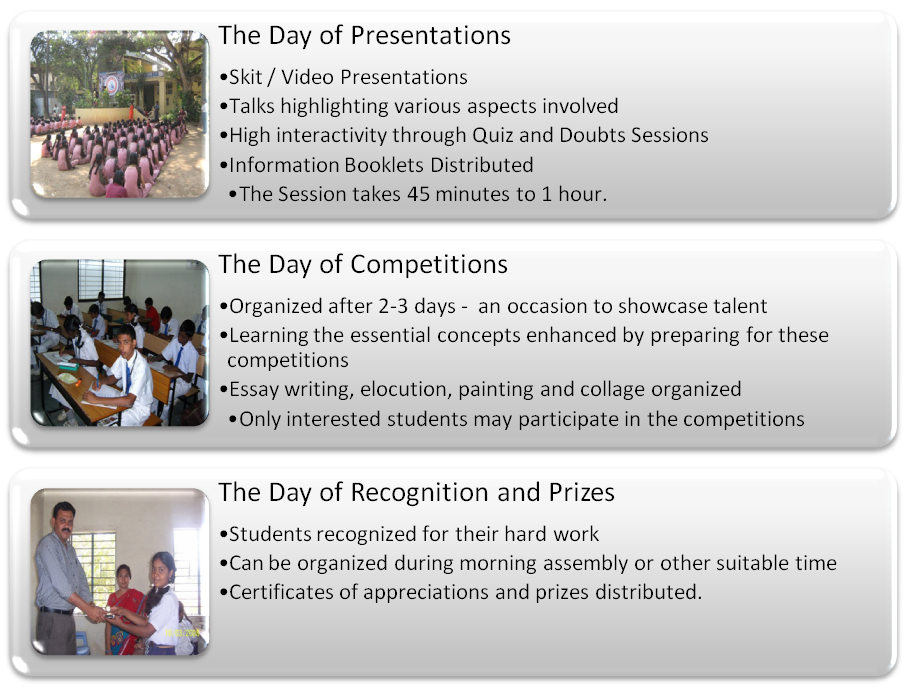
Program Introduction
Consider the following facts:
- One out of two persons looking for blood fails to get it from the blood bank.
- Someone requires blood every 2 minutes in Bangalore.
- 5 lakh women die each year during pregnancy. A quarter of these due to shortage of blood.
- If just 1% of people donate blood regularly, there will be no blood shortage.
Blood for humans comes only from humans. The only way to provide hope and life to the 2,00,000 people who require blood in Bangalore each year is increasing the number of voluntary blood donors.
In-spite of being a proven double blessing – to the donor and to the needy – blood donation in our state as it is in some other parts of our country. Where states like West Bengal, Maharashtra and Tamil Nadu are crossing the 90% mark in voluntary blood donation, we are still struggling at a meagre 55%. Immediate attention and action is therefore the need of the hour.
Why Schools
The students of class VIII, IX and X come to know various facts regarding Blood through their school curriculum. But they are unaware about the process of Blood Donation. This is the right age to make them aware of the Blood Donation process, as they are the future potential donors. Proper education imparted to the right people at the right time can make a BIG DIFFERENCE. Misconceptions will be reduced if these young minds have the correct information.
Today there are many educated people who are actually unaware about the proper procedure of blood donation. When they go for blood donation they actually do not undergo proper tests which are important for their safety. With proper knowledge there will come proper safety and a sense of happiness in donating blood.
Educating the students at this age will show results once they turn eligible for blood donation. With proper knowledge on blood donation and no myths and misconceptions in their minds they will become regular blood donors.
If they are aware about the blood scenario in their society then there shall be no patient ever dying due to the shortage of blood.
Rakta Kranti Schools is a programme by Sankalp India Foundation towards the same goal.
Program Details
The programme is organized over a period of three days in the school.

Work Done
More than 6000 students have been educated and motivated through the programme till date.
The following are few of the schools where the program has been conducted:
Ambedkar School Shree Bharati Public School Chinmaya Vidyalaya Subhash Memorial School Govt. High School IISc Modern Public school Adarsha Vidyalaya Hindu Balika Vidyalaya KMWA Vidyaniketan St.Micheal School Vidya Vahini School Vidya Bharti School GRV Public School Methodist Mission R T Nagar Public School Iyer High School Sri Vinayaka Sunrise School M S Ramaiah School
Principal's Opinion About The Program
“The programme inculcated about blood donation among the students. The skit exhibited the facts of blood donation and its importance. They created the awareness of importance and benefits of blood donation at the time of emergency. It was an educative programme in which our children participated actively. ”
-Gowri Shree
(Coordinator)
M.S.Ramaiah Vidyaniketan
“At the outset, I would like to thank you for sending a team of your volunteers to our school to create awareness about the significance and need for blood donation. I would also like to place a record of appreciation for this team, their resourcefulness, enthusiastic activities in promoting the knowledge about blood donation. I thank you all for organizing the competitions like painting, essay, collage which made us to realize the hidden talents of our students. I do wish a great success in your challenging task of saving people.”
(Principal)
Methodist Mission High School
“Dear friends of Sankalp India Foundation,
It is indeed a great service creating awareness among the school students about blood donation. I appreciate your effort; you are taking time from your busy schedule and doing a great job to the society.
Wishing you all the great success. “
-Rema Nandakumar
(Principal)
Chinmaya Vidyalaya
Sankalp Unit
